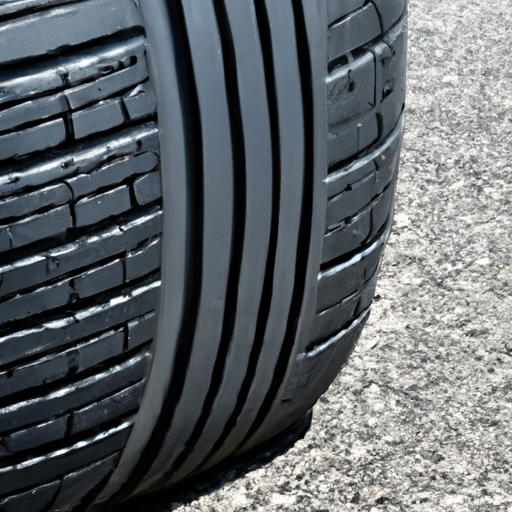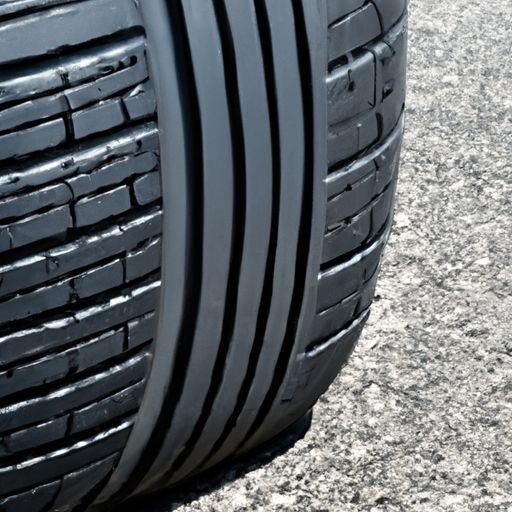If you live in a mild climate, you may be wondering if you can get away with using summer tires all year long. While it may seem tempting to skip the hassle of switching to winter tires, it’s important to consider the potential drawbacks and safety concerns. In this article, we will explore the pros and cons of using summer tires year-round in mild climates, helping you make an informed decision about your tire choice.

Overview
Definition of summer tires
Summer tires, also known as performance tires, are designed to provide optimal performance and handling in warm weather conditions. They are specifically engineered to maximize traction and grip on dry roads, offering superior acceleration, braking, and cornering capabilities. The tread patterns and compounds used in summer tires are designed to maintain their flexibility and grip at high temperatures.
Definition of mild climates
Mild climates refer to regions or areas that experience relatively moderate temperatures throughout the year. These climates are characterized by mild winters, with temperatures rarely dropping below freezing. Mild climates often have warm summers, but not excessively hot. Examples of mild climates include parts of coastal California, the Mediterranean region, and certain areas in Australia.
Characteristics of Summer Tires
Tread pattern
Summer tires feature a unique tread pattern that is optimized for warm weather conditions. The tread pattern typically includes large, continuous ribs that maximize the contact area with the road surface, resulting in enhanced traction and stability. Additionally, the tread pattern of summer tires may incorporate wider grooves and sipes to effectively disperse water and prevent hydroplaning on wet roads.
Tread compound
The tread compound used in summer tires is specially formulated to provide optimal grip and performance in warm temperatures. Summer tires usually utilize a softer rubber compound that maintains its flexibility even in hot weather, allowing for better traction and handling. This softer compound provides improved grip during cornering and braking, enhancing overall performance.
Performance in wet conditions
While summer tires excel in dry conditions, they may not perform as well in wet or rainy conditions. Due to their tread patterns and compounds, summer tires may have limited traction on wet roads, increasing the risk of hydroplaning. The shallower grooves and fewer sipes in the tread pattern can make it challenging for the tires to effectively channel water away, reducing their performance in wet conditions.
Advantages of Summer Tires in Mild Climates
Improved traction on dry roads
In mild climates, where dry roads are more common, summer tires offer significant advantages. The tread patterns and compounds used in summer tires optimize grip on dry surfaces, providing enhanced traction and improved handling. These tires allow for better acceleration, shorter braking distances, and increased stability, ultimately leading to a safer and more enjoyable driving experience.
Better handling and cornering
Summer tires are specifically designed to provide precise handling and cornering capabilities. The unique tread pattern and softer tread compound allow these tires to maintain optimal grip and responsiveness during turns and maneuvers. The improved handling characteristics of summer tires in mild climates can enhance the overall driving experience, promoting driver confidence and control.
Fuel efficiency benefits
Summer tires are engineered to reduce rolling resistance, resulting in improved fuel efficiency. The lower rolling resistance of these tires requires less energy to keep the vehicle moving, translating into potential fuel savings. In mild climates where long distances are covered, the fuel efficiency benefits of summer tires can have a positive impact on both the environment and the wallet.
Potential Risks of Using Summer Tires Year-round
Reduced performance in cold temperatures
One of the key drawbacks of using summer tires year-round, even in mild climates, is their reduced performance in cold temperatures. The softer rubber compounds used in summer tires tend to harden in colder conditions, resulting in decreased traction and grip on icy or snowy roads. This can significantly impact the vehicle’s ability to stop, accelerate, and navigate safely, posing a potential risk to the driver and passengers.
Limited performance in winter conditions
While summer tires provide excellent performance in mild climates, they are not designed to handle the challenges of winter conditions. The tread patterns and compounds of summer tires are not optimized for snow and ice, leading to decreased traction and compromised safety. In areas that occasionally experience freezing temperatures or sporadic snowfall, using summer tires year-round can pose a risk and hinder the vehicle’s performance in winter weather.
Increased wear and tear
Using summer tires year-round in mild climates can result in increased wear and tear. The softer rubber compounds and unique tread patterns characteristic of summer tires are specifically designed for warm weather conditions. Continuous usage in colder temperatures, particularly below freezing, can cause accelerated wear, reducing the tire’s lifespan. This can lead to frequent tire replacements, resulting in additional expenses for vehicle owners.

Considerations for Using Summer Tires Year-round in Mild Climates
Temperature fluctuations
While mild climates generally experience moderate temperatures, it is essential to consider potential temperature fluctuations throughout the year. Even in mild climates, there can be periods of cold weather or sudden temperature drops, particularly during winter nights. These fluctuations can affect the performance and safety of summer tires, making it crucial to assess the frequency and severity of temperature changes before deciding to use them year-round.
Driving habits and patterns
Another critical consideration for using summer tires year-round in mild climates is understanding your driving habits and patterns. If you frequently travel long distances, engage in spirited driving, or frequently navigate curvy roads, the enhanced performance and handling characteristics of summer tires may be beneficial. However, if your driving consists mainly of short trips, city commuting, or highway driving at moderate speeds, the advantages of summer tires may not outweigh the potential risks and costs.
Availability of winter tires
It is essential to consider the availability of winter tires in your area before deciding to use summer tires year-round. If you occasionally encounter winter conditions or anticipate traveling to regions with colder climates, having a dedicated set of winter tires is highly recommended. Winter tires are specifically designed to provide optimum traction and handling in snow and ice, ensuring safer driving in challenging winter circumstances. If winter tires are readily available, using them during colder months can alleviate the risks associated with relying solely on summer tires.
Alternatives to Using Summer Tires Year-round
All-season tires
All-season tires offer a compromise between summer and winter tires, providing decent performance in various weather conditions. These tires feature tread patterns and compounds designed to handle both warm and mild winter conditions. While they may not offer the same level of performance as summer tires in dry and warm conditions, all-season tires can be a suitable alternative for drivers in mild climates who prefer a more versatile tire throughout the year.
Winter tires with all-season capabilities
Another alternative to using summer tires year-round is utilizing winter tires with all-season capabilities. These tires are specifically designed to provide optimal performance in winter conditions, including snow and ice. However, they are engineered to offer improved performance in dry and wet conditions as well. The tread patterns and compounds of these tires strike a balance between winter and all-season performance, making them suitable for drivers in mild climates who want the added security and traction of winter tires without compromising performance in other seasons.

Essential Tire Maintenance
Regular tire inspections
Regardless of the type of tires used, regular tire inspections are crucial for maintaining optimal performance, safety, and longevity. Inspecting the tires regularly allows you to identify any signs of wear, damage, or under-inflation, which can impact performance and safety on the road. Checking the tread depth, sidewall condition, and tire pressure ensures that the tires are in good condition and have sufficient grip for optimal performance.
Proper inflation
Maintaining proper tire inflation is essential for safety, tire longevity, and fuel efficiency. Under-inflated or over-inflated tires can negatively impact traction, handling, and tire wear. Referencing the vehicle manufacturer’s recommended tire pressure and regularly checking and adjusting tire pressure accordingly is essential. In mild climates, where temperature fluctuations may be minimal, it is still important to monitor and maintain proper tire inflation throughout the year.
Rotation and alignment
Regular tire rotation and proper wheel alignment play a significant role in maximizing tire performance and longevity. Rotating the tires at recommended intervals allows for more even wear and extends their lifespan. Proper wheel alignment ensures that the tires are aligned correctly, preventing uneven wear and ensuring optimal handling and performance. Following the manufacturer’s recommendations for rotation and alignment can help optimize the use of summer tires or any other tire type.
Legal Considerations and Regulations
Local laws and regulations
It is essential to be aware of any relevant local laws and regulations regarding tire usage in your area. Some regions and countries require the use of winter tires or specific tread patterns during certain months or in specific weather conditions. Familiarizing yourself with these laws and regulations ensures compliance and promotes safer driving. Ignoring these requirements can result in fines, penalties, and potential insurance complications in the event of an accident.
Insurance implications
Using summer tires year-round in mild climates may have insurance implications, particularly if an accident occurs during winter conditions. Insurance companies may consider the use of inappropriate or inadequate tires as a contributing factor to an accident, potentially affecting claim settlements. To avoid any insurance complications, it is advisable to check with your insurance provider regarding the use of summer tires and adherence to local regulations.

Expert Recommendations
Manufacturer recommendations
Manufacturers of both summer and winter tires provide specific recommendations and guidelines for their optimal usage. These recommendations are often based on extensive testing and research to ensure the tires’ safety and performance. It is highly advisable to follow the manufacturer’s recommendations regarding tire usage, maintenance, and limitations. Their expertise and knowledge of the tires will help you make informed decisions and maximize safety and performance.
Advice from tire experts
Consulting tire experts, such as tire dealers or mechanics, can provide valuable insights and recommendations tailored to your specific driving needs and conditions. These professionals have extensive knowledge and experience in the tire industry, enabling them to provide expert advice on tire selection, usage, and maintenance. They can help you evaluate the suitability of summer tires year-round in your mild climate and provide alternative options based on their expertise.
Conclusion
Weighting the pros and cons of using summer tires year-round in mild climates is essential to make an informed decision. The improved traction on dry roads, better handling and cornering capabilities, and fuel efficiency benefits make summer tires attractive in such conditions. However, the reduced performance in cold temperatures, limited performance in winter conditions, increased wear and tear, and potential legal and insurance implications should also be considered.
Before using summer tires year-round, factors such as temperature fluctuations, driving habits, and the availability of winter tires must be taken into account. Alternatives like all-season tires or winter tires with all-season capabilities offer viable options to mitigate the drawbacks of summer tires. Regular tire maintenance and adherence to legal regulations and manufacturer recommendations are crucial for maximizing safety and performance.
Ultimately, the decision to use summer tires year-round in mild climates should be based on individual circumstances, priorities, and risk tolerance. Assessing the specific needs and conditions, consulting experts, and understanding the potential risks will help drivers make an informed choice that promotes safety, performance, and satisfaction.


